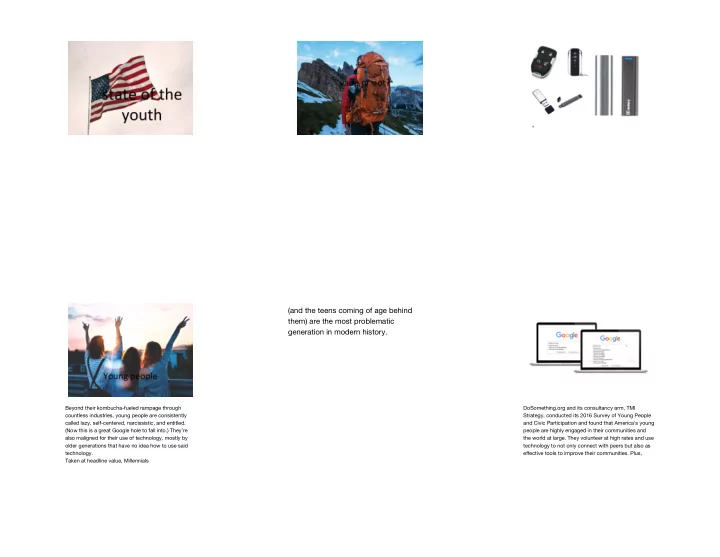

(and the teens coming of age behind them) are the most problematic generation in modern history. Beyond their kombucha-fueled rampage through DoSomething.org and its consultancy arm, TMI countless industries, young people are consistently Strategy, conducted its 2016 Survey of Young People called lazy, self-centered, narcissistic, and entitled. and Civic Participation and found that America’s young (Now this is a great Google hole to fall into.) They’re people are highly engaged in their communities and also maligned for their use of technology, mostly by the world at large. They volunteer at high rates and use older generations that have no idea how to use said technology to not only connect with peers but also as technology. effective tools to improve their communities. Plus, Taken at headline value, Millennials
they view their generation as central to fixing the problems they inherited. And all this while being the healthiest and most responsible generation yet. Wow. Logan Paul 16 million Instagram ASMR - Autonomous sensory For all the talk about young people being lazy, addicted to technology, and entitled, they sure find an meridian response ( ASMR ) is an followers and Youtube wonder unprecedented amount of time to give back. experience characterized by a static- Results from DoSomething.org/TMI Strategy’s 2016 Survey of Young People and Civic Participation show like or tingling sensation on the skin that 62% of young people (13–25) volunteered at least that typically begins on the scalp and once in the past moves down the back of the neck and upper spine.
12 months, and of those who do parents. Compare this to the 50% of low- volunteer, 49% do so at least once a income individuals who feel they will be month. better off than their parents and the 20% Moreover, while the scope of this of them who feel they will actually be research was limited to young people, worse off, underscoring the perception there is growing evidence that these high that upwards social mobility is rates represent an increase over previous increasingly difficult. generations. (How’s that for “lazy,” Grandpa?) today’s young people are disenchanted and distrustful with the powers that be. Just 1 in 2 young people surveyed agreed they would have a better life than their parents, while the others felt it would be worse or about the same. For those reporting above-average income, over 60% foresee a better life, whereas only 8% feel they will be worse off than their content creator (integrated quality cameras, free editing tools, etc.) and to open platforms (YouTube, Instagram, etc.) to post content and reach massive audiences. Young people are not just volunteering at high rates — they’re also using technology to discover, amplify, and direct their social ideals and civic engagement.This change has occurred alongside the proliferation of new technologies (smartphones, wifi, etc.), the rise of social networking (Facebook, Twitter, etc.), and drastic reduction in the barriers to being a
Perhaps even more exciting, results from DoSomething.org/TMI Strategy’s 2016 Survey of Young People and Civic Participation shows that increased connectivity (spending more time on more platforms) correlates positively with an increase in civic participation.
Recommend
More recommend